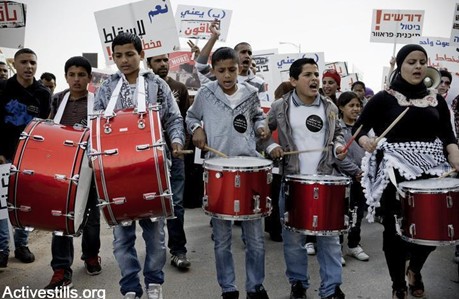
On Wednesday, May 8, a large conference was held in Be’er-Sheva, organized by the Headquarters for Justice and Equality for the Bedouin in the Negev in cooperation with the Regional Council of the Bedouin Unrecognized Villages. Among the various speakers at the conference, Hanan Al-Sana of Sidre, Attorney Rawia Aburabia of ACRI and Haia Noach, Negev Coexistence Forum for Civil Equality’s executive director, spoke against the Prawer Plan. During the conference, the attendees discussed how to continue the struggle against the plan.
The Ministerial Committee on Legislative Affairs is set to discuss the Bill on the Arrangement of Bedouin Settlement in the Negev and the Arab-Bedouin community, Communist Party of Israel – Hadash and human rights organizations strongly object to the bill – which is based on the Begin Plan – and want it removed from the Knesset and government’s agenda.
An information sheet prepared by the Association for Civil Rights in Israel (ACRI) and Bimkom – Planners for Planning Rights sets out the major problems with the bill which if it becomes law, will cause the displacement and forced eviction of dozens of villages and tens of thousands of Bedouin residents, dispossessing them of their property and historical rights to the lands, destroying the social fabric of their communities, and sealing the fate of thousands of families into poverty and unemployment. The Bill on the Arrangement of Bedouin Settlement in the Negev is based on the Begin Plan, approved by the government on January 27, 2013, which effectively constitutes a modified version of the Prawer Plan for Bedouin settlement in the Negev, approved by the government on September 11, 2011.
The bill outlines a framework for the implementation of government policies toward the Bedouin population on two separate issues: the evacuation of unrecognized villages in the Negev, and the settlement of ownership of lands in the Negev. The bill is based on the absolute negation of the Bedouin population’s rights to property and historical ties to the land, in violation of the residents of the unrecognized villages’ basic rights. Around half of the Arab population in the Negev – some 90,000 people – live in 46 Bedouin towns and villages. This accounts for just five percent of the entire land of the Negev region. Israel does not recognize 35 of these villages. These Israeli citizens are denied their most basic rights: their villages are not connected to the state’s water and sewer systems nor to its electrical grid; education and health services are only partially provided to them, and are inadequate; and the state refuses to recognize villagers’ historical claims of ancestral ownership of the land.
Like Prawer, the Begin Plan is also based on an erroneous assumption that views the Bedouin as “squatters,” ignoring the fact that most of the villages have been in existence in their current location since before the establishment of the State of Israel. Other villages were established by coercive transfer during the period of martial law. Like its precursor, the current plan also seeks to restrict the Bedouin to a specific area and to forcibly apply this policy. The plan will lead to the uprooting and forcible eviction of dozens of villages and 30-40,000 Bedouin residents, who will be stripped of their property and their historical land rights. Thousands of families will be condemned to poverty and unemployment. The communal life and social fabric of these villages will be destroyed. The plan also implies that the Bedouin population should be concentrated in a specific area in recognized settlements and that no Bedouin settlements will be established beyond this predefined area – compounding concerns of ethnic discrimination.
The attempt to create a special arrangement on land issues for a specific group severely undermines not just the principle of the rule of law but also the principle of equality under the law. The state cannot legislate arrangements that, in effect, suspend the application of administrative and constitutional law regarding actions and authorities granted to the state according to that same law. The state also cannot legislate arrangements that suspend real estate law for the Bedouin population when they are valid and apply to all other citizens. Not only have unique planning regulations been created for the Negev Bedouin settlements which are not an integrated part of the regular Israeli planning laws, these regulations are also discriminatory towards the Bedouin when compared to Jewish localities in the area. There are currently over a hundred Jewish settlements in the Be’er-Sheva Region, with an average population of approximately 300 people per community. This is in addition to dozens of lone farms, which were established without a permit but some of which were retroactively granted permits by the government. The bill fails to take into account the circumstances of each specific unrecognized village and instead treats all of the villages as a single entity, without examining the relevant facts in each specific instance.
Related:



